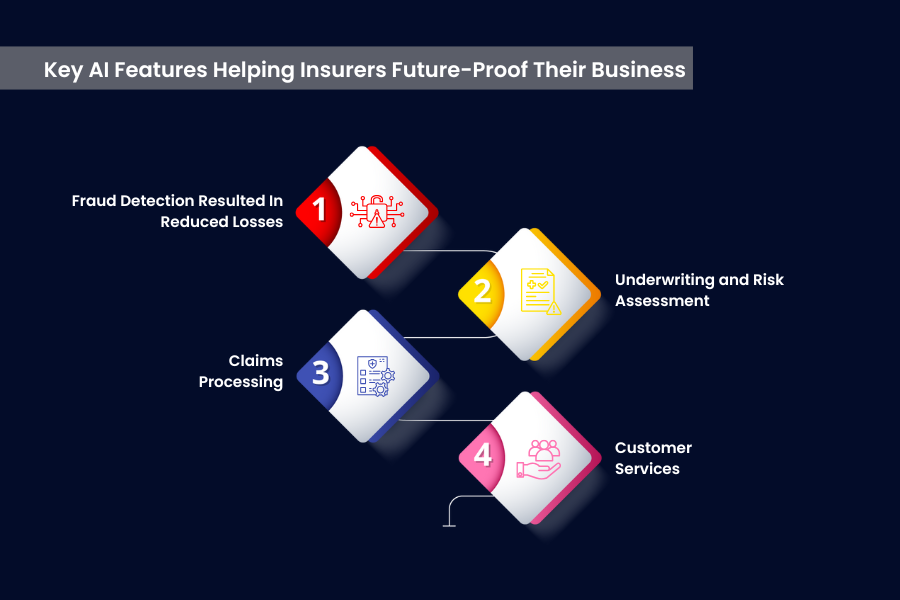
Even the legit legacies are disrupted due to a false system or following blind patterns that lead you nowhere. After all, time demands change!
This context is entirely for the insurance businesses that are still stuck with their legacy insurance management software. Do you know as per a survey, “ 72% of data leaders fear that failing to adopt AI will result in a competitive disadvantage for their organizations.” So if you don’t understand what the competition is about, you are already out of it. Today, AI in insurance is the only resource that ensures your business remains future-proof.
While most advanced insurance companies have already integrated AI into their insurance systems, many are still clinging to legacy insurance management systems. Although it’s an outdated pattern, even if it is working for you, your insurance business might not be safe in the future. Hence, in this blog, we will explore why most smart insurance companies have adopted or are inclining towards AI and digitalization in the insurance industry. How they are ensuring that their insurance business remains future-safe with digital insurance solutions. Let’s delve deep:
The Importance of AI in Digital Insurance
The AI market is rapidly growing because of the efficiency it brings to different uses in different sectors. According to resources, global AI in the insurance market is projected to reach $14 billion by 2025. This is not just because of the tech development in diverse sectors, but also because AI has the potential to transform the insurance sector and make profound advancements. From easing manual workforce tasks to performing seamless insurance claims and credit, AI is taking over the digital insurance industry. According to McKinsey & Company, AI will dominate underwriting and distribution within five years, underscoring the urgency for insurers to integrate AI into their operations. (resources)
But beyond all the modernization and advanced features, there was a growing urgency to replace legacy insurance management systems. Why? Because legacy insurance systems were hampering the growth of digital insurance companies. Hence, digitalization in the insurance industry and AI came into the frame. Let’s learn about these challenges:
How Legacy Insurance Systems Are Holding Insurers Back?

Digital Insurance Solution for Insurers who rely on legacy insurance systems end up paying extreme maintenance costs, despite that they remain inflexible and incompatible with modern digital insurance solutions. Without providing much flexibility, legacy insurance management systems limited the scope of digitalization in the insurance industry. Here is how:
Data Silos
Legacy systems perform and reposit data individually, which leads to scattered data collection. It results in limited data analysis, restricting the capability to scrutinize massive data and informed decision-making.
Limited Scalability
In today’s digital environment, data generation is massive! Legacy insurance systems are not capable of handling the constantly increasing volume of data. This can hamper the growth of any digital insurance company.
Integration Issues
Incorporating AI in digital insurance legacy systems is challenging. They require significant customization, are resource-intensive, and might not be compatible to work with new advanced technologies.
Security Concerns
Legacy systems do not support modern security compliance features. One security breach can cost millions. With the growing cyber attacks, having insurance software that can support modern security compliance became the demand of time in order to avoid any type of security breaches or attacks.
Customer Experience
Undoubtedly, users’ experience decides if your business is going to make it or break it. However, in legacy systems, it was impractical for the agents to quote, bind, or modify policies, whereas there was no transparency, speed or personalized policy options for the customers as well.
These are just some of the primary obstacles that developed the urgency of AI in insurance. Regardless of industry changes, AI is consistently proving its capability to future-proof digital insurance models.
Key AI Features Helping Insurers Future-Proof Their Business

Here are some of the top features that ease a lot of struggles that traditional insurance management software causes companies to face in their legacy systems. These features have not only enhanced the capability of insurance companies but have also safeguarded their business with future-proof AI insurance solutions.
Fraud Detection Resulted In Reduced Losses
AI-enabled fraud detection allows digital insurance systems to detect any fraudulent activities by analyzing subtle patterns and anomalies. They can also prevent proactive fraud by detecting real-time transactions through machine learning models. The AI system flagged potentially fraudulent claims, leading to a 30% decrease in fraud-related losses as per resources. It has resulted in reduced losses and has also enhanced customer service by expediting legitimate claims. The Future of insurance is digital, and fraud detection works as a shield in protecting this evolution.
Underwriting and Risk Assessment
With AI models, digital insurance systems were able to analyze vast datasets that help in better risk assessment and improve underwriting decisions. It not only helped them with a streamlined underwriting process but also helped them with building personalized insurance products which can be customized as per future challenges and possibilities.
Claims Processing
Insurance companies can save a lot of handling time with improved accuracy as automation with AI performs seamless claim processing. AI in insurance also helps with detecting fraud, expediting approvals, and elevating overall customer satisfaction. This has eliminated the long and monotonous claim processing time. With a smooth insurance process and decision-making accuracy, it helps insurance companies provide quick insurance access to customers building loyalty and credibility in the market over time.
Customer Services
To ensure satisfying customer engagement, AI-driven chatbots and virtual assistants provide customer support and query-handling services round-the-clock. They also excel in policy management tasks and ensure better customer engagement, allowing the manual workforce to focus on other vague problems. This has eased companies with improved insurance processes, addressing customers’ concerns, and helped cater to their requirements with personalized insurance services, making themselves a reliable insurance resource for the future.
Beyond all the above-mentioned features, AI in insurance genuinely enhances the ability of digital insurance software to perform all insurance practices seamlessly. It ensures that legacy systems do not hamper the evolution of the insurance industry. Hence, AI in insurance, with its advanced features, safeguards insurance organizations, allowing them a wider scope to cater to customer requirements with an enhanced satisfaction rate. But how do any insurance companies ensure an AI model in their insurance system? By connecting with a reliable insurance AI service provider like Ensurite.
The Takeaway
From the national and international insurance companies, AI in insurance has provided customers a seamless experience. But even beyond that, by incorporating AI in their insurance management software, companies can safeguard their business with future-proof technologies. AI is easy to avail of customized features that cater to specific business needs and are forever ready to adapt to future advancements. One of the best cloud-based digital distribution platforms provides the best AI in insurance solutions by understanding your requirements and providing customized solutions. Wondering how we can benefit you? Contact with our experts now for free!
Explore more Blogs: https://ensurite.ai/blog/
Frequently Asked Questions
Can AI-powered insurance solutions enhance customer engagement and Personalization?
Yes, AI-powered insurance solutions can considerably enhance customer engagement and personalization. This is because digital insurance setups powered by AI allow insurers to analyze massive datasets, analyze customers' data, predict their behavior, and provide highly personalized services and suggestions. Moreover, multiple features like chatbots, dynamic pricing, and personalized policy options can help you build a loyal customer base with increased user engagement and overall customer experience.
How can insurers integrate AI-driven solutions with their existing infrastructure?
Integrating AI-driven solutions into existing infrastructure can be performed through APIs, modular AI tools, and cloud-based platforms. However, if done professionally by a digital insurance company service provider, it would result in more accurate integration of AI in the insurance setups of your company.
How can AI-powered automation reduce operational costs for insurance providers?
AI-powered automation helps complete repetitive tasks automatically. Hence, tasks like document verification, claim processing, and customer services can be easily done without requiring a manual workforce. This has even led to a 40% reduction in operational costs, improved accuracy, and frees up human resources for strategic functions. (reference)
What is the impact of AI on digital insurance distribution and customer acquisition?
Features like predictive Analytics, targeted marketing, and real-time customer profiling have revolutionized digital insurance distribution. This has enabled insurers to identify high-potential leads, personalize offerings, and enhance conversion rates, which has eventually resulted in efficient, data-driven customer acquisition across channels.
